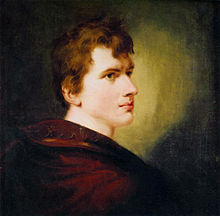Metamorphoses of Society
Metamorphoses of Society is a novella by Achim von Arnim , written in 1823 and published in 1826 as the first contribution to the cycle “Landhausleben” .
Title, time and place
The aging Rittmeister, the main character from the "higher circles", describes himself - perhaps a little jokingly - as a philosopher. He goes on about the “disease of the age” and explains a characteristic of the Restoration - the “constant metamorphosis of society”. Very little plot is offered in the rather voluminous text. Rather, a picture of the “spiritual situation” of Berlin in 1823 is painted.
content
The young Arthur, a nephew of the Rittmeister, calls the 18th century, which "gave birth to philosophy and the revolution", an unhappy time. But it's over. The “poison of the revolution” no longer penetrates people. Arthur recognizes the uncle's economic dexterity in managing the family's estates. The Rittmeister has lived separately from his pious wife Miranda and their daughter Georgine for twenty years and asks himself: should he become pious for the sake of both of them? The answer is difficult. After all, he has often mocked and scolded about piety - this “restorative soup for the state”. But the Rittmeister admits to himself that he can no longer live without Miranda because he has only now started to love her.
For a while the Rittmeister had once successfully been Minister of War and had even played a gamble on the side. To his surprise, the Prince appointed him Minister of Spiritual Enlightenment due to a misunderstanding. So he heads the supreme bishop and must now prevent young Protestants from becoming Catholics. The new minister accepts the appointment. He says to himself: “Anyone who can give orders at all must be able to command everything.” As a first official act, he burns the files of his ninety-year-old predecessor in the fireplace and throws his lustful French books after them. He knows the best of it by heart anyway.
The pious Miranda does not understand her own turnaround. Suddenly she wants to live entirely for her husband, wants to "surrender to a man who mocks the most sacred thing, even tries to destroy it in himself with unheard of violence by burdening others with false miracles and enjoying her short-sightedness." Miranda means one Incident during their service. The husband had accidentally fired a pistol shot at the church from the neighborhood. The aftermath of the shot was portrayed as that miracle. Miranda sees through what is going on. Nevertheless, the woman strives with power to return to the marriage port.
The prince betrothed Georgine to his privy councilor Arthur that the existence of the world would be secured. The new minister unmasked at a masquerade ball and announced his upcoming silver wedding anniversary with Miranda to society. The newlyweds say good night to everyone.
Prussia
The novella can be read as the sum total of Arnim's criticism of time. A large number of people and appearances are alluded to or discussed. For example, neo-pietism in Pomerania and Berlin, spiritualism at the court of Friedrich Wilhelm II and the influence of Joanna Southcott and Claus Harms are mentioned.
The “provost” probably means Johann Christoph von Woellner , the “swollen minister” Hans Rudolf von Bischoffwerder and “Herr von Haller” Karl Ludwig von Haller .
Quotes
- "Music is a reminder of the primordial movement of our soul."
- "It is mainly cheek that we rulers have gained through this contemporary history."
Self-testimony
- In a letter dated December 26, 1826, Wilhelm Grimm criticized the novella. Arnim replied on June 4, 1827: "... not a word in it is carelessly written ...".
reception
- Arnim considered culture and religion to be elements of the state. Accordingly, he castigated the state fragmentation in the form of seemingly endless controversial political discussions in the story.
- Schulz calls the Rittmeister a liberal writer who has a balancing effect and thus wants to prevent violence.
literature
- Helene M. Kastinger Riley : Achim von Arnim . rowohlt's monographs edited by Kurt Kusenberg . 158 pages. Reinbek near Hamburg in July 1979, ISBN 3-499-50277-1
- Gerhard Schulz : The German literature between the French Revolution and the restoration. Part 2. The Age of the Napoleonic Wars and the Restoration: 1806–1830. 912 pages. Munich 1989, ISBN 3-406-09399-X
Quoted text edition
- Achim von Arnim: Metamorphoses of Society. Sunday story by the country preacher. P. 227–328 in Karl-Heinz Hahn (Ed.): Ludwig Achim von Arnim: Works in one volume. 423 pages. Library of German classics. Issued by the NFG . Aufbau-Verlag Berlin and Weimar 1981 (1st edition)
Individual evidence
Source means the quoted text edition
- ↑ Source, S. XLIV, 18. Zvu
- ↑ Riley, p. 107, 6. Zvo
- ↑ Berlin , the residence of the Kingdom of Prussia, is not mentioned, but is most likely meant as the place of the "action".
- ↑ Hahn in the source, p. XLIV below
- ↑ Source, p. 403, reference to p. 227
- ↑ Source, p. 404, reference to p. 235
- ↑ a b source, pp. 325, 409
- ↑ Source, pp. 240, 404
- ↑ Source pp. 240, 404
- ↑ Source pp. 293, 407
- ↑ Source, p. 281, 2nd Zvu
- ↑ Source, p. 288, 9. Zvu
- ↑ cited in Riley, p. 108, 5th Zvu to p. 109, 4th Zvo
- ↑ Riley, p. 108, 15. Zvu
- ↑ Schulz, p. 409, 18. Zvo
- ↑ Schulz, p. 409, 27. Zvo
